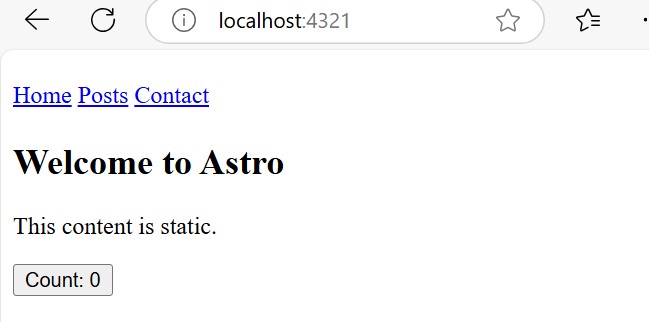
- Astro JS Tutorial
- Astro JS - Home
- Astro JS - Overview
- Astro JS vs Next JS
- Astro JS vs React JS
- Astro JS Setup
- Astro JS - Installation
- Astro JS - Project Structure
- Astro JS - Pages
- Astro JS Architecture
- Astro JS - Islands
- Astro JS - Islands Architecture
- Astro JS Routing
- Astro JS - Routing
- Astro JS - Dynamic Routing
- Astro JS - Redirecting Routes
- Astro JS - i18n Routing
- Astro JS Configuration
- Astro JS - Configuration
- Astro JS - Editor Setup
- Astro JS - TypeScript Configuration
- Astro JS - Environment Variables
- Astro JS Build UI
- Astro JS - Components
- Astro JS - Slots
- Astro JS - Layouts
- Astro JS - Fonts
- Astro JS - Scripts
- Astro JS Create Website
- Astro JS - Markdown Contents
- Astro JS - Add Images
- Astro JS - Manage Content
- Astro JS - Content Collections
- Astro JS - Data Fetching
- Astro JS Styling and CSS
- Astro JS - Styling
- Astro JS - CSS Integration
- Astro JS - CSS Cascading Order
- Astro JS Integrations
- Astro JS - React Integrations
- Astro JS - Svelte Integrations
- Astro JS - Solid Integrations
- Astro JS - Vue Integrations
- Astro JS Adapters
- Astro JS - Netlify Adapter
- Astro JS - Cloudflare Adapter
- Astro JS Testing and Deployment
- Astro JS - Testing
- Astro JS - Deployment
- Astro JS Advanced Topics
- Astro JS - State Management
- Astro JS - Prefetching
- Astro JS - Middleware
- Astro JS - Endpoints
- Astro JS - Authentication
- Astro JS - Bun Environment
- Astro JS - Docker
- Astro JS - View Transition
- Astro JS - Transition Directives
- Astro JS - Astro DB
- Astro JS - Bundling
- Astro JS Useful Resources
- Astro JS - Interview Questions
- Astro JS - Cheatsheet
Astro JS - React.js Integration
What is React.js?
ReactJS is a free and open-source front-end JavaScript library which is used to develop various interactive user-interfaces. It is a simple, feature rich and component based UI library. React is famous for it's component based architecture and virtual DOM. This allows developers to build reusable UI components and optimize the performance of web applications. Also react library provides large set of ready-made components and hooks to build complex UIs. Astro allows us to integrate react components in astro applications.
React Integration in Astro
Astro provides built-in support for React.js by using React adapter to render React components. You can write your favorite UI components in React and optimize them for performance using Astro. Let's see how to integrate React.js with Astro.
Get Started With React in Astro
Follow the steps below to integrate React.js with Astro:
Step 1: Install React Adapter
First, you need to install the React adapter for Astro. You can do this using the following command:
>> npm install @astrojs/react
Step 2: Configure React in Astro
Next step is to apply the integration to your astro.config.ts and tsconfig.json files using the integrations property:
import { defineConfig } from 'astro/config';
import react from '@astrojs/react';
export default defineConfig({
// ...
integrations: [react()],
});
Now, Add following code to your typescript configuration file (tsconfig.json)
{
"extends": "astro/tsconfigs/strict",
"include": [".astro/types.d.ts", "**/*"],
"exclude": ["dist"],
"compilerOptions": {
"jsx": "react-jsx",
"jsxImportSource": "react"
}
}
Step 3: Create a React Component
Now, you can create a React component in your Astro project. You can keep your components in the '/src/components' directory. Here is an example of a simple React component:
// src/components/Counter.jsx
import { useState } from "react";
export default function Counter() {
const [count, setCount] = useState(0);
return (
<button onClick={() => setCount(count + 1)}>
Count: {count}
</button>
);
}
Step 4: Use the React Component in Astro Page
Now, you can use the React component in your Astro page. The code below defines an Astro page at 'src/pages/index.astro'. The page imports the Counter component and renders it in the page.
<!-- File: src/pages/index.astro -->
---
import Layout from '../layouts/Layout.astro';
import Counter from "../components/Counter.jsx";
---
<Layout>
<h1>Welcome to Astro</h1>
<p>This content is static.</p>
<!-- React Counter Component -->
<Counter />
</Layout>
Step 5: Run the Astro Project
Now, if you run Astro project, you can see the React component in your Astro page. The counter component will increase the count by 1 when the button is clicked.
